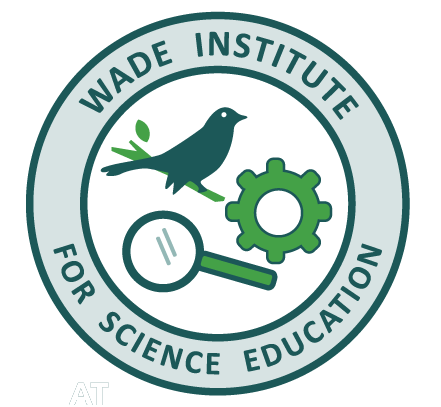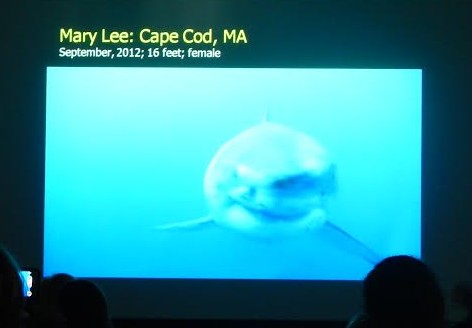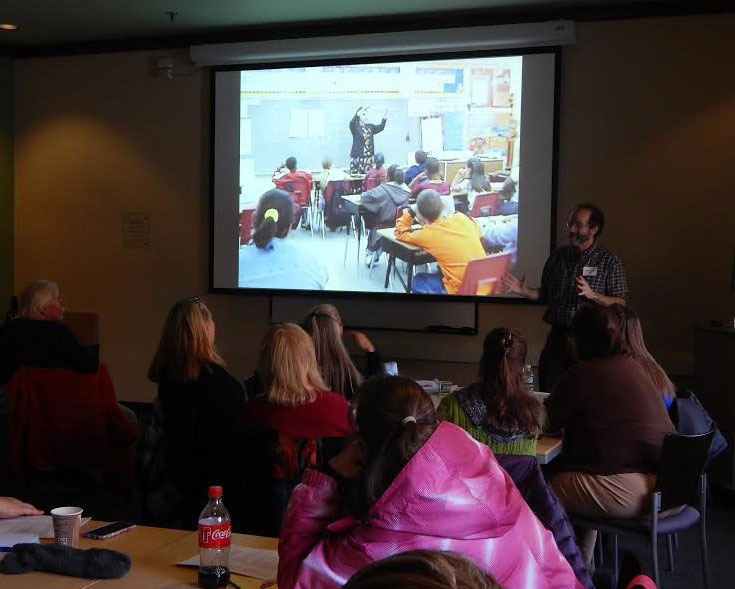Friday, January 22, 2016
For Immediate Release
MITS Professional Development Seminar Dives Deep into Shark Research and Understanding Children’s Thinking
On January 20th, Museum Institute for Teaching Science kicked off its first Professional Development Seminar of 2016. Held at Clark University, the all day seminar gathered together nearly 50 educators from education institutions in the region. The focus of the morning session was the use of technology in marine science while the afternoon session focused on understanding children’s cognitive processes.
Greg Skomal of Massachusetts Division of Marine Fisheries started the day off with his presentation Sneaking Up On Sharks and Telling
Their Tales with Data. Skomal discussed the progression of technologies used to track and learn about shark species off the coast of Massachusetts and beyond. He highlighted technologies such as passive acoustic telemetry, pop-up satellite tagging and autonomous underwater vehicle tracking.
Of particular interest to participants was Skomal’s work with OCEARCH, a leading organization in marine animal science. Using the organization’s Global Shark Tracker, one can follow individual shark’s travel patterns in real-time. The applications for this program in the educational setting are endless. In fact, OCEARCH has developed a STEM curriculum around their tracker, available for educators to use as they wish. As Skomal stated, “The general public is thirsty for science. Once you engage the public they start taking a serious interest in these animals.” He went on to highlight the powerful role interactive tools like OCEARCH can play in engaging students in marine ecology and other science fields.
Dr. David Hammer of Tufts University led the afternoon session, Understanding Children’s Thinking: The Practice of Constructing Explanations. Using classroom video footage, Hammer led seminar participants in dissecting children’s scientific explanations of various physics experiments. The videos sparked interesting discussions among participants, exploring ideas of creating supportive classroom settings, how to model intellectual empathy as an educator, and using appropriate student assessment tools.
Hammer emphasized that at the elementary level, educators should focus on how students are processing and explaining scientific information, rather than pushing them to generate the “right” answers. With this approach we can truly access the crux of effective science education. “Doing science is about learning how to learn,” he said. “Science is a pursuit. Science is inquiry”. Hammer admits that this approach is a complex one, but it is crucial if educators wish to inspire and support budding scientists.
Overall, educators found the seminar to be thought-provoking, rich with educational resources and an excellent opportunity to network with colleagues in the field. We look forward to seeing participants return in February, March and April!
Professional Development Seminars are designed for staff, volunteers and other professionals from science, environmental, natural history, technology, art, history and other cultural institutions and centers in New England. Seminars are designed as professional development opportunities to provide content and teaching resources as well as networking opportunities for professionals in informal education settings. Each seminar is a full day session. The mornings are spent exploring STEM content areas with scientists, researchers and policy makers. Afternoon sessions are skill-based, focusing on turning real-life science into exciting, inquiry-based, minds-on, hands-on lessons and activities for K-12 students and teachers. The PDS registration fee for participants is $40 per full-day session with discounted fees for attending 3 or more sessions. Interested educators may register online or print out a mail-in registration form at www.mits.org.
MITS is a not-for-profit corporation that collaborates with formal and informal education institutions to provide STEM professional development opportunities for K-12 teachers and non-profit organizations across Massachusetts. Program offerings include week-long graduate level Summer Professional Development Institutes, day-long Professional Development Seminars and Customized School Services. For more information, visit www.mits.org.
###


